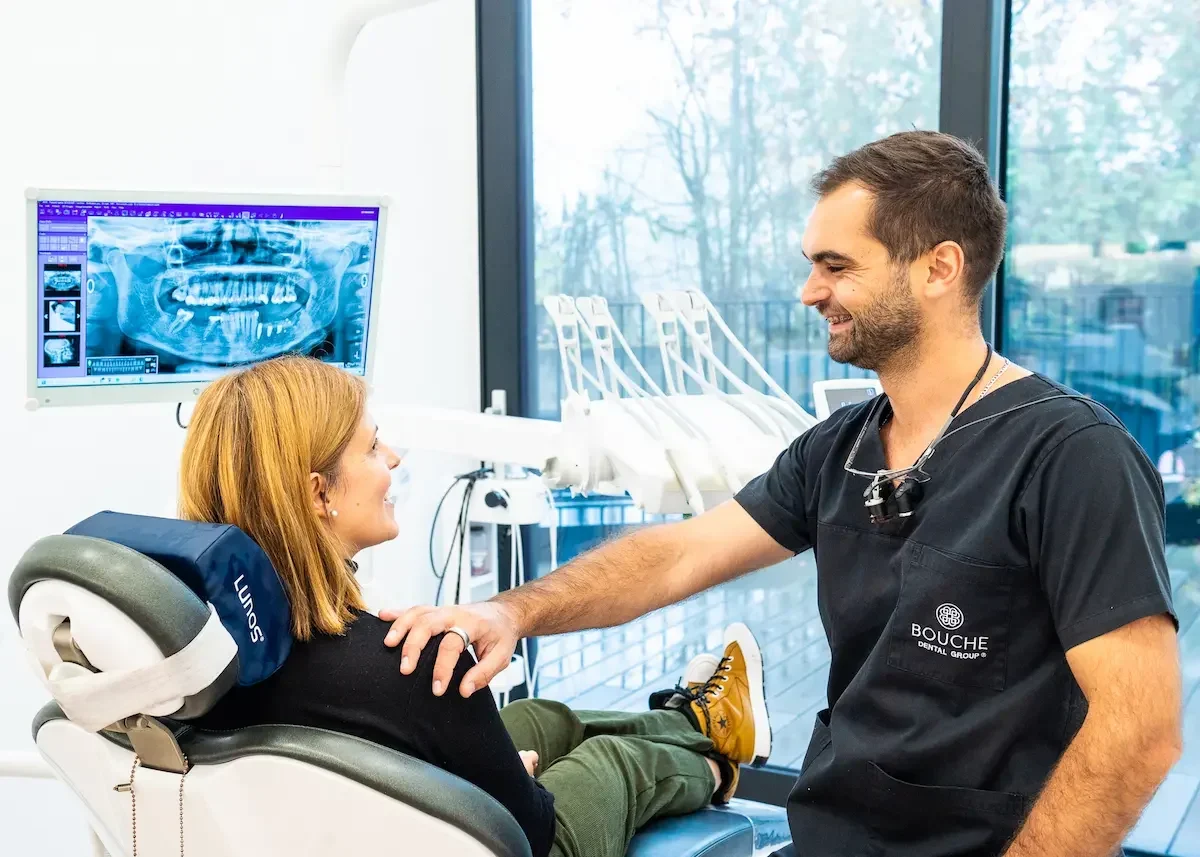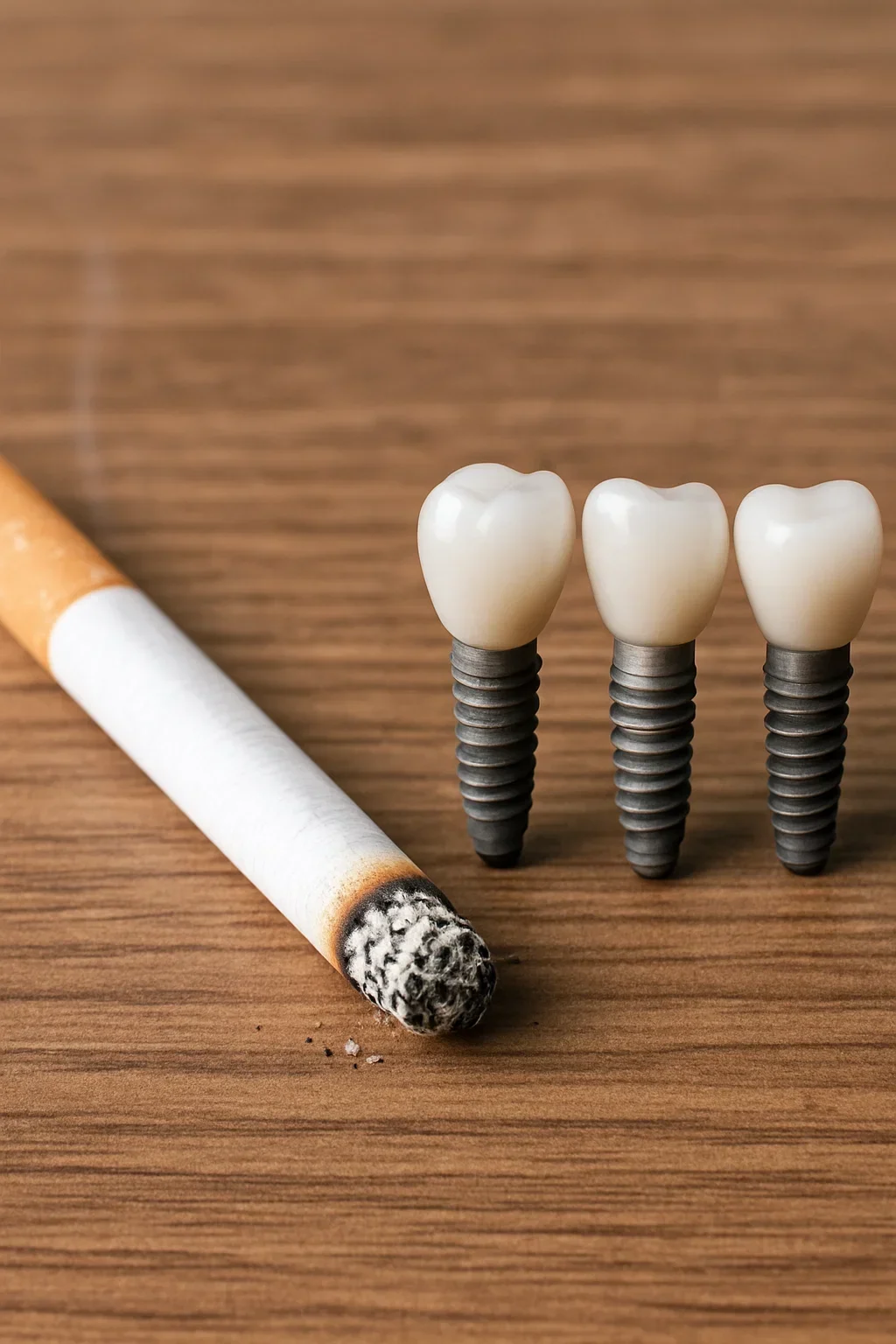
Smoking and Dental implants: Oral health is closely tied to our daily habits, and smoking is one of the most harmful factors. When it comes to treatments like dental implants, tobacco use raises additional concerns that cannot be ignored. In this article, we explore the main risks associated with tobacco use in patients who use or plan to use dental implants, the recommended precautions, and the importance of a multidisciplinary approach for treatment success.
Bouche Dental Group works with a network of specialized dentists in Luxembourg, making it easier for patients to access the best professionals for each type of necessary treatment.
Dental implants are an effective and long-lasting solution for replacing missing teeth. However, for the treatment to be successful, it is essential that the implant integrates correctly with the bone — a process called osseointegration. Smoking negatively interferes with this critical phase, significantly increasing the risk of implant failure.
Scientific studies show that smokers have a higher implant failure rate than non-smokers. This happens because the substances in tobacco directly affect tissue vascularization, compromising healing and hindering bone regeneration.

The effects of smoking on the oral cavity are extensive and involve multiple systems:
Decreased gingival blood flow: Nicotine causes vasoconstriction, reducing blood flow to the gums. This makes healing after implant surgery more difficult.
Increased inflammation: Smoking alters the body’s defenses, making oral tissues more susceptible to infections such as mucositis and peri-implantitis.
Changes in oral microbiota: The smoker’s mouth favors the growth of pathogenic bacteria, which can compromise implant stability.
Reduced saliva production: Smoking reduces saliva, essential for maintaining oral balance and tissue protection.
Staining and halitosis: Smoking causes discoloration of teeth and prosthetics, as well as persistent bad breath.
Smokers face several risks when opting for dental implants:
Osseointegration failure: This may occur in the first weeks after surgery and is strongly linked to smoking.
Peri-implantitis: Inflammation around the implant that can lead to its loss, especially in smokers with impaired immune response.
Surgical complications: Higher risk of postoperative infection and reduced healing capacity, affecting grafts.
Compromised aesthetics: Discoloration of prostheses and gum inflammation can impact the final visual outcome.
Yes, but the patient must understand the increased risks and follow specific precautions. Many dentists recommend quitting smoking at least during the initial healing period (2–3 months after surgery).
Even temporary cessation significantly improves prognosis. If smoking continues, strict oral hygiene and more frequent check-ups are essential.

If you smoke and are considering or already have dental implants, keep in mind the following recommendations:
Smoking reduction or cessation: Ideally, stop smoking before surgery and remain abstinent during healing.
Strict oral hygiene: Brush twice a day, use dental floss, and rinse with alcohol-free mouthwash.
Regular dental check-ups: Monitor peri-implant health, remove tartar, and adjust prosthetics when needed.
Balanced diet: Eat foods rich in vitamin C and calcium to support bone and tissue regeneration.
Limit alcohol and caffeine: Like smoking, these can impair healing and increase oral inflammation.
Although the risk of complications is higher, many smokers maintain healthy implants for years — especially with proper care and guidance.
Success depends on detailed planning, high-quality materials, close clinical follow-up, and the patient’s commitment to hygiene and lifestyle changes.
Smoking is a major enemy of oral health and a significant risk factor for anyone considering or already wearing dental implants. Still, with a well-structured plan, expert care, and close monitoring, good results are achievable.
At Bouche Dental Group, we work with a network of experienced and specialized dentists in Luxembourg to guide each patient personally. If you’re a smoker considering implants or already have them and want to ensure their longevity, contact us. You’ll have access to the best professionals and support to protect your smile — with or without tobacco.